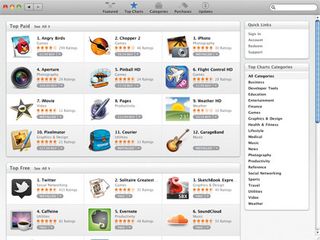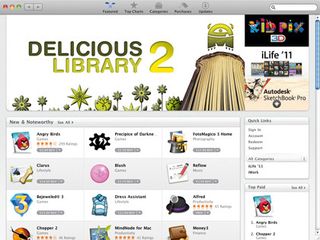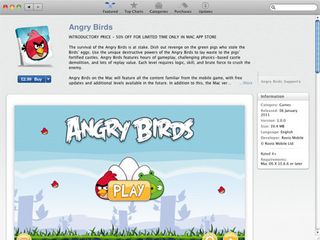Is the Mac App Store an opportunity for devs - or a threat?
App developers air their opinions

January 2011 marked the dawn of a new age for Mac users: the introduction of Apple's Mac App Store. Available initially in beta form for Snow Leopard users, the Mac App Store will become standard issue on all shipping Macs when Mac OS X Lion arrives later this year.
As a conduit for third-party software developed for the Mac, Apple's Mac App Store represents a tremendous opportunity for some developers, and a serious dilemma for others. Many developers are thrilled with the prospect of reaching new customers through the Mac App Store.
Essentially, what it brings to the table is a new distribution system for delivering a broad range of Apple-blessed software into the hands of willing customers in the easiest possible way. It's a maintenance-free system that many developers who have iOS app experience are already familiar with.
Take Brian Greenstone. He's president of Pangea Software, an independent Mac game developer, whose roots go back to the early, 'classic' days of Mac OS. "We're putting out all of our Intel-compatible OS X applications," he says.
Pangea saw tremendous success by releasing its stable of games in iOS form when the iOS App Store hit the scene. But Greenstone's not counting on lightning striking twice with the release of the Mac App Store.
Tempered expectations
"I certainly don't expect a repeat of 2008," says Greenstone. "That caught everyone off guard, but this time people are ready, and there will be much more competition from the start. I do expect this to boost our Mac game sales to levels that we haven't seen in many, many years. It should be a very nice boost for us."
Get daily insight, inspiration and deals in your inbox
Sign up for breaking news, reviews, opinion, top tech deals, and more.
Daniel Jalkut is another developer looking forward to putting his software on the App Store. His company, Red Sweater Software, makes utilities such as MarsEdit, a popular blogging application, Black Ink, a crossword puzzle app, and others.

"I do plan to release most of my apps on the Mac App Store, provided Apple is willing to approve them," says Jalkut. "The store is the biggest opportunity we've ever had, especially us small-time indie developers, to grow our market and reach the millions of new customers Apple is bringing to the platform."
Trusted source
Bare Bones Software will also be publishing through the Mac App Store. The makers of BBEdit and Yojimbo see the Mac App Store as a new, important way of reaching customers.
"First, the Mac App Store represents a 'trusted source' market for our products," explains Bare Bones founder Rich Siegel. "A potential customer who sees our app in the Mac App Store may be more likely to purchase it than if they'd come across it on our website. Second, it's much easier to ensure customers have the latest available software, because it essentially integrates our products into the official Mac OS X 'Software Update' mechanics (which is something developers have been desiring for a very long time now)."
Mariner Software plans to launch six titles on the Mac App Store, according to its President, Michael Wray: "In a nutshell, I guess you could say we are 'optimistically enthusiastic yet slightly unclear' when it comes to the workings of the Mac App Store."
One telling observation is that none of the developers we talk to are ready to publish software exclusively through the App Store. For these experienced Mac developers, the Mac App Store is another way of reaching customers, but not the only one.
"For now, we're treating the Mac App Store as an additional sales channel, because we still offer direct services (upgrade pricing, educational discounts, quantity pricing, site licenses and such) that aren't available from the Mac App Store; and many of our customers are accustomed to dealing directly with developers and prefer to continue to do so," says Siegel. "I can't say whether the Mac App Store will evolve into an exclusive sales channel for us, or not – it's too soon to tell at this point."
Wray agrees. "We are looking at the Mac App Store as another domestic reseller channel. We have products in the retail stores, we have direct sales, we have domestic and international distribution, and in 2011, an affiliate network. The Mac App Store is just another arm for us to promote our products to the masses."
Apple's revenue share with Mac App Store developers is the same as its iOS App Store – 70% goes to developers, 30% goes to Apple. That's an awful big nut for Apple, say some developers, compared to what they're paying now to payment processing companies.
"Some developers may have such a strong investment in technologies that Apple doesn't approve of, or have such a mighty independent marketing operation, that it would be foolish to share 30% with Apple to give up complete control over their products," says Jalkut.
Too big a cut?

One of those developers is Shirt Pocket's David Nanian. "Payment processors such as PayPal and Square charge far, far less than 30%, and even 'storefront' providers like eSellerate – which handles all aspects of the purchasing process, including an integrated store, download hosting, customer support, fraud prevention, and so on – charge more along the lines of 10%."
Rogue Amoeba CEO Paul Kafasis agrees: "A developer has to do a lot more work providing more features, more functionality. Apple, on the other hand, does no extra work selling a more expensive application, yet their cut (in raw numbers) gets much larger."
Kafasis notes that some of his colleagues think the Mac App Store will provide invaluable marketing exposure for their products. But Kafasis doesn't expect that great Mac apps will rise to the top simply because they're good products. "I have to wonder if they've actually paid attention to the iOS App Store. There are a few big winners of course, but there are many, many apps that hover near zero in terms of sales," says Kafasis.
Wray of Mariner Software, whose products are also sold on retail shelves, takes a different perspective. "The Mac App Store revenue model is consistent with margins any reseller would receive, so I don't think [Apple's] percentage is outlandish or lopsided," he says. "The reality is that Apple is in the business to make money. And while it certainly has a few bucks in the bank and is currently riding an impressive wave of momentum, it still needs initiatives like this to continually succeed when it comes to a return on its investment."
"Do developers end up getting less per unit for products sold through the Mac App Store than they do by handling their own payment processing and electronic delivery? Certainly," admits Siegel. "Will the Mac App Store bring enough additional sales to compensate for the difference? I hope and expect so."
Ownership issues
By putting itself between the customer and the developer, the Mac App Store creates an artificial, Apple-controlled barrier that Shirt Pocket's Nanian is also uncomfortable with.

"Apple very clearly considers the customers to be 'theirs,'" Nanian says. "You don't get any information about them. In fact, while the customer can post reviews about your software on your store page, you can't respond to those reviews, either online or offline, because there's no way to contact those users."
Bare Bones' Siegel echoes Nanian's sentiments about the difficulty of building customer relationships in the event of using Apple's store exclusively. "The Mac App Store mechanics are such that we won't actually know who our customers are unless they reach out to us via other means. This makes it much more difficult to build enduring customer relationships, which are part of Bare Bones' stock in trade."
Wray is concerned about how removing direct contact with Mac App Store customers will affect issues such as major upgrades. "I have a suspicion this method might cause more confusion than [Apple] are expecting," he says. "There are a lot of these logistical kinds of questions that I'm sure will be answered pretty quickly. At least I hope so… for everyone's sake."
"Does the sacrifice being asked of developers, in money and freedom, justify the benefit we receive?" asks Jalkut. "I believe the answer for most developers is 'yes'."
Most Popular

